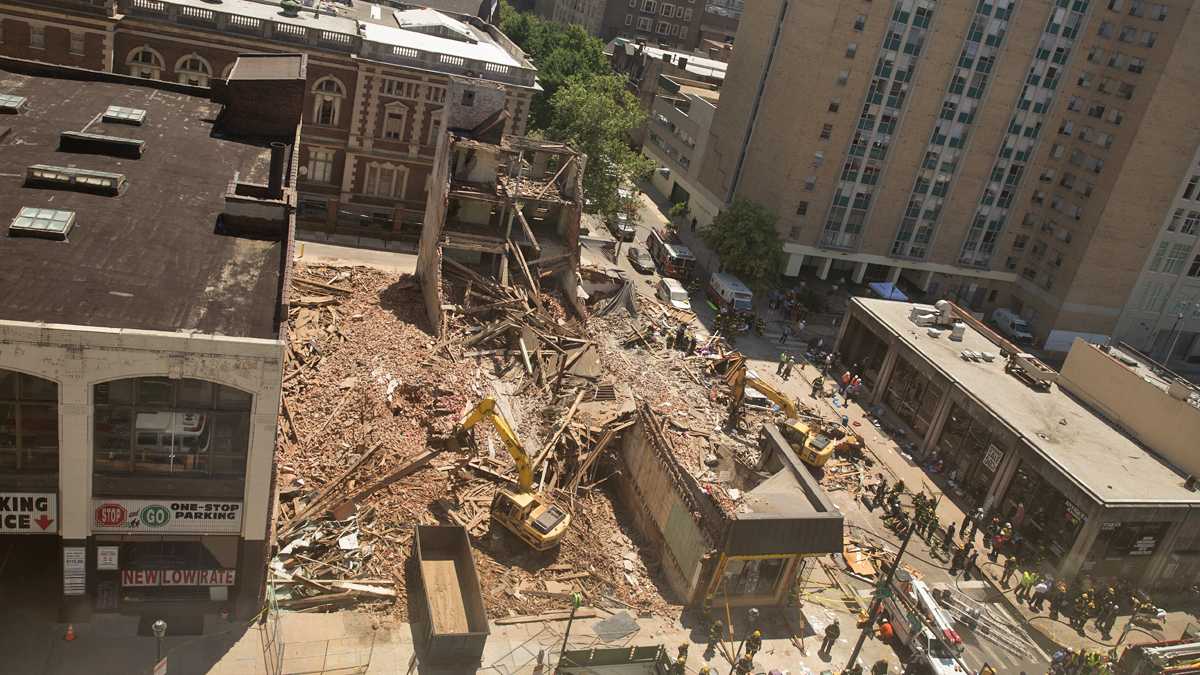Contractor in deadly building collapse testifies he had little experience

Rescue personnel search the rubble of the collapsed building at the corner of Market and 22nd streets in Center City Philadelphia on June 5, 2013. Taking the stand Wednesday, demolition contractor Griffin Campbell during his murder trts(Lindsay Lazarski/WHYY)
Griffin Campbell has held a lot of jobs over the years. He’s worked at warehouses, lumberyards and gas stations. He’s also poured cement and operated a food truck.
It wasn’t until 2012 that he started doing building demolitions. He just kind of fell into it while he was renovating houses in his North Philadelphia neighborhood.
A little more than a year later, he found himself at the center of one of highest-profile tragedies in city history.
Campbell was hired to demolish several properties along Market Street in the heart of Center City. On June 5, 2013, a three-story, unsupported wall collapsed onto the neighboring Salvation Army Thrift Store, killing six people and injuring 13 more.
On Wednesday, Campbell energetically pieced together part of this timeline and more after taking the witness stand during the third – and final – week of testimony in his third-degree murder trial.
Campbell, 51, is also charged with involuntary manslaughter, aggravated assault and other offenses.
Before being hired to take down properties on the 2100 and 2200 blocks of Market Street, Campbell said he had only demolished a pair of three-story row homes near 15th Street and Erie Avenue.
An architect, Plato Marinakos, had offered him the work.
“I’ve never in my life turned a job down,” said Campbell.
Marinakos then asked Campbell if he was interested in demolishing the Market Street buildings, including the Hoagie City building that later crushed the Salvation Army store.
At the time, Campbell didn’t have a general contractor’s license. And he hadn’t worked on a project of this scale.
Still, Campbell said, he wasn’t nervous. Marinakos told him he’d guide him through the demolition process.
Marinakos had also made it clear that there would be plenty more work after Market Street – music to Campbell’s ears because he had debt he wanted to pay off.
“That’s why I took the job,” said Campbell. “I had no reason not to trust him,”
The Market Street job would pay $112,000. Campbell said Marinakos submitted the bid on his behalf. Campbell had never done that before.
As part of the deal, Campbell was also welcome to salvage the building’s guts.
Before the collapse, Campbell said, selling the salvage had netted him between $20,000 and $25,000.
Campbell said he was also expected to hand Marinakos a piece of the take – a token for getting him the gig. For the Market Street job, he said it was $5,000.
Bill Hobson, Campbell’s attorney, will continue direct questioning first thing Thursday. Prosecutors will then have the chance to cross-examine Campbell.
Testimony will likely center on the deadly collapse of the building, which Campbell called a “terrible accident.”
They argue that Campbell knowingly put lives at risk when he cut corners while taking down the building and that he was more interested in turning a profit from the salvage than public safety.
On Wednesday, Campbell responded.
“Any job I do, I’m concerned about safety,” he said. “You should be.”
If convicted, Campbell could face life in prison.
WHYY is your source for fact-based, in-depth journalism and information. As a nonprofit organization, we rely on financial support from readers like you. Please give today.





